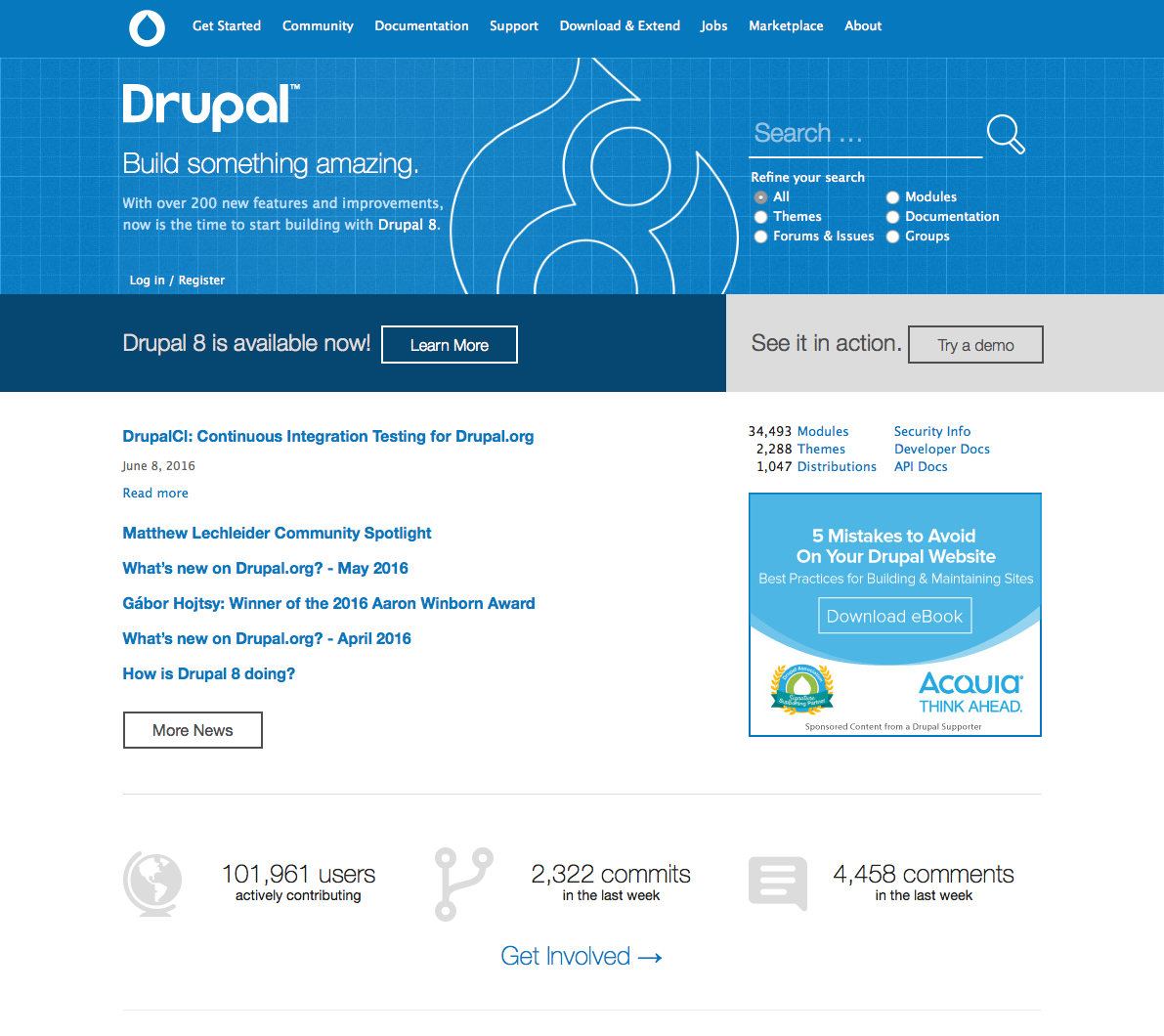 Support for Drupal 7 is ending on 5 January 2025—it’s time to migrate to Drupal 10! Learn about the many benefits of Drupal 10 and find migration tools in our resource center.
Support for Drupal 7 is ending on 5 January 2025—it’s time to migrate to Drupal 10! Learn about the many benefits of Drupal 10 and find migration tools in our resource center.
Last year, Drupal Association staff—in collaboration with Forum One—developed the content strategy for Drupal.org. One of the problems that surfaced early-on during that project was the problem of communicating with the community. Rolling out the new Sections on Drupal.org is part of how we are starting to address that.
Sharing important communications with the community as a whole was, and still is, a challenge, mainly due to how hard it can be to find clear, “official” communication channels on specific topics. Because Drupal.org has grown organically, an important announcement could be posted to a number of different places: to forums, to the homepage, to a group on groups.drupal.org, to the issue queue, or to the Drupal Association blog on assoc.drupal.org.
A community member might know about the existence of some of the channels, but not the others. For them, it is not clear which channel(s) to watch to make sure they don't miss important things. And when you are the one sharing important information, it is really hard to know if your message actually reached the people who needed to see it.
Many hours, a bunch of post-its, and quite a few Google docs were spent figuring out a better structure. Here are the communication channels we plan to create and consolidate.
Communication channels
We grouped all the various ways to send a message into groups based on the purpose.
Primary communication channels
These channels are the main source of all the news and announcements. They will include original content written specifically for these channels. The content will be published frequently, following an editorial calendar schedule in each channel.
News
- ‘Official’ source of news on: Drupal (the software), Drupal.org (the website) and the Drupal Association.
- Located in a dedicated News & Events section.
- Curated content - mainly press releases, official announcements.
- Comments are not enabled on this content.
Blogs
- Blogs on a limited number of topics - aligned with top level Sections of the site. E.g. About section includes Drupal blog, Drupal.org section includes 'Drupal.org blog', Community section - 'Community blog', etc.
- More frequent and less official updates and announcements.
- Discussions happen here via comments.
- Managed by maintainers of respective Sections.
Secondary communication channels
These channels will be used to support communication happening via primary channels. They also will include original content, but communication might be less frequent, aimed to support only the most important announcements.
DrupalCon sessions
- In-person communication with the community.
- Opportunity to get direct feedback.
- Opportunity to communicate via live presentation.
- Video recordings available on events.drupal.org.
Webcasts
- An opportunity to do an extended presentation on the topic with slides and questions from the audience.
- Video recordings available on Drupal.org.
Tertiary Communication Channels
These channels will be used to retranslate messages from the primary and secondary channels to a larger audience or different audience segments. They will provide the ability for the community to follow and consume information from primary and secondary channels in different ways. No original content will be written for these channels.
Drupal.org homepage
- Highlight important information for Newcomers, Learners and Skilled users.
- News and Blog posts can be promoted.
Planet Drupal
- Provides ability to consume information from primary channels via RSS.
- All primary channels will have feeds added to Planet.
- There is no need to promote something to the homepage to get it on Planet anymore.
Newsletters
- Provides ability to consume information from primary channels via email.
- These are various newsletters sent by the Drupal Association staff.
Social media
- Provides ability to consume information from primary channels via preferred social media.
Direct communication channels
Mailing lists
In some cases for community members with specific roles or duties, we use mailing lists for private two-way communication. E.g. mailing lists for working groups, infrastructure team, webmasters and other users with advanced access on the site.
Which existing channels will be replaced?
This restructure of the communication channels means that some of the existing ones might be replaced by new and better alternatives, including:
- Announcement-only groups (e.g. core, governance) will eventually be migrated into blogs for appropriate sections on Drupal.org
- News and announcements forum will be eventually replaced by a combination of topical blogs
- Assoc.drupal.org blog will eventually be replaced by a blog in Drupal Association section on Drupal.org
- Groups.drupal.org homepage will eventually be replaced by the landing page for groups area on Drupal.org.
The First Steps
It will take some time to put all these channels, tools and processes in place. But the first steps have already been taken, and we're working to bring the idea to life.
Blogs
We've decided to tackle primary communication channels first. The first primary channel we are implementing is the blog. Most of the top-level sections will have a topical blog inside of them. Typically, those blogs will be curated and only section maintainers will be able to publish posts in them. The following blogs already exist:
Drupal.org blog
As with the Sections, we wanted to try the concept out on a less visited area. So we created the Drupal.org Blog first. It is a main source of announcements and updates our team will share from now on instead of the assoc.drupal.org blog or Drupal.org forums. In fact, this post you are reading now is in that blog already.
Drupal blog
The Drupal blog is a part of 'About' section. It is a main source of important news and announcements about Drupal project. The editorial calendar for the blog is managed by the Drupal Association. And posts are typically written by staff or members of the Drupal Core committers team.
Keep up-to-date with blogs
At the moment, to follow new posts you can subscribe to an RSS feed for each blog. The ability to subscribe to new posts via email, or have them show up in your tracker, will be added soon.
All of the posts from both Drupal.org and Drupal blogs appear on Planet Drupal automatically, and the most important ones will also be promoted to the homepage for additional visibility.
The posts are typically also announced on Twitter (@drupal_org and @drupal respectively). And you can follow comments on individual posts to take part in discussions.
We are excited to take this first step towards improving community communications on Drupal.org. Watch this space for more news and updates.












Comments
Love it - nice and clear -
Love it - nice and clear - good work everyone!
Thank you!
Thank you!
Announcing vs. communicating
These strategies seem like they are mostly aimed at the DA announcing what is happening -- which is useful. Thanks for that!
However, maybe in the next iteration of the communication strategy, you can clarify how the DA wishes to *receive* communications from the community about its concerns? Responding to blog posts and attending DrupalCon sessions seem to be the only communication channels listed above that the community can participate in at any level -- the rest of the channels seem to be only ways for the DA to communicate its decisions and policies.
What's missing is a channel where the community can raise concerns that haven't already been blogged about, and a strategy for communication and dialog while and before decisions are made, rather than just announcing decisions after they are already set.
Thanks for your comment.
Thanks for your comment. Valid points raised.
For this particular project our focus was on how to push an important piece of communication out to the community (which is reflected in the type and structure of channels). Any important piece of communication. So this is not specifically (or only) Association communicating its decisions and policies. This is about various groups of community members communicating their announcements too, e.g. core maintainers with important news about Drupal, perhaps initiative leads, Working Groups with various announcements they make, etc.
Each of those groups has different decision making process, different places and methods to collect concerns, input and feedback during that process. And I am not sure we can unify them all in a document like this post of mine.
Your questions, however, seem to be about Association specifically. I passed this internally, we'll be thinking how to make this more clear. If you have immediate concerns now, you could use our contact form https://assoc.drupal.org/contact or issue queue https://www.drupal.org/project/issues/association_drupalorg.
Oh, didn't realize!
I had no idea this communication strategy was for everyone -- I just assumed it was for the Association pushing out announcements, based on the first paragraph of the post here.
Hopefully the other groups who are supposed to use this communication strategy know about this change (and were involved in deciding on it, better yet)... For instance, the Core maintainers currently use groups.drupal.org/core to communicate important information about Core development (they've centralized on that). Are they going to switch, and if so has anyone told them they must?
I had no idea this
Sorry if I wasn't clear there. Yeah, the content strategy we developed is for all content on Drupal.org, not only for the content produced by the Association staff. And so the idea for communication channels is to support any important announcement as well.
The post describes overall plan. It will take some time to implement all of it. So yeah we gave some on the core team (those frequently posting announcements) heads up. But no change is happening for /core today or next week. When we get to it (that is when we'll start working on migrating g.d.o into Drupal.org), we'll talk to all core maintainers and work out the details where and how /core should move together. We might have some recommendations based on the overall content strategy for the site, but of course we'll make any final decision with their input. And that is true for any existing channel which might be affected.
@jhodgdon Yes! thanks for
@jhodgdon Yes! thanks for articulating that so clearly.
I agree that seems to be missing here, and I couldn't quite put my finger on it.
Perhaps that's being considered elsewhere, if so, it would be great to hear about it.
Donna Benjamin - @kattekrab
Drupal Association Board